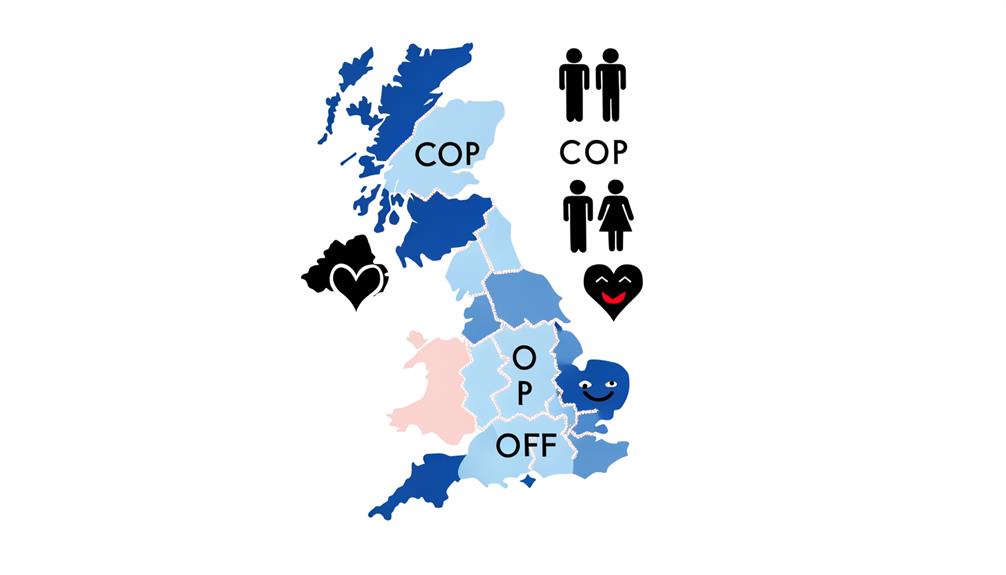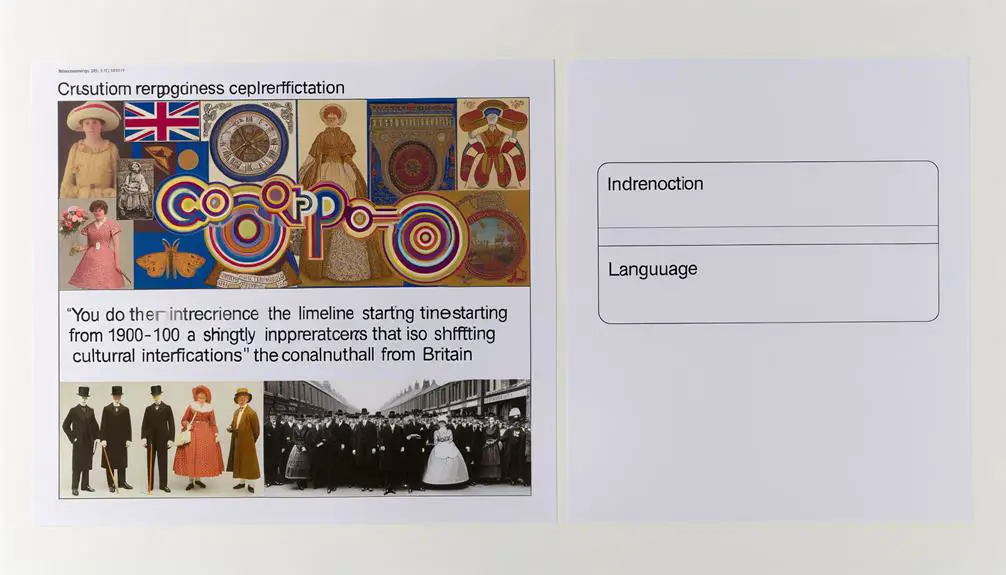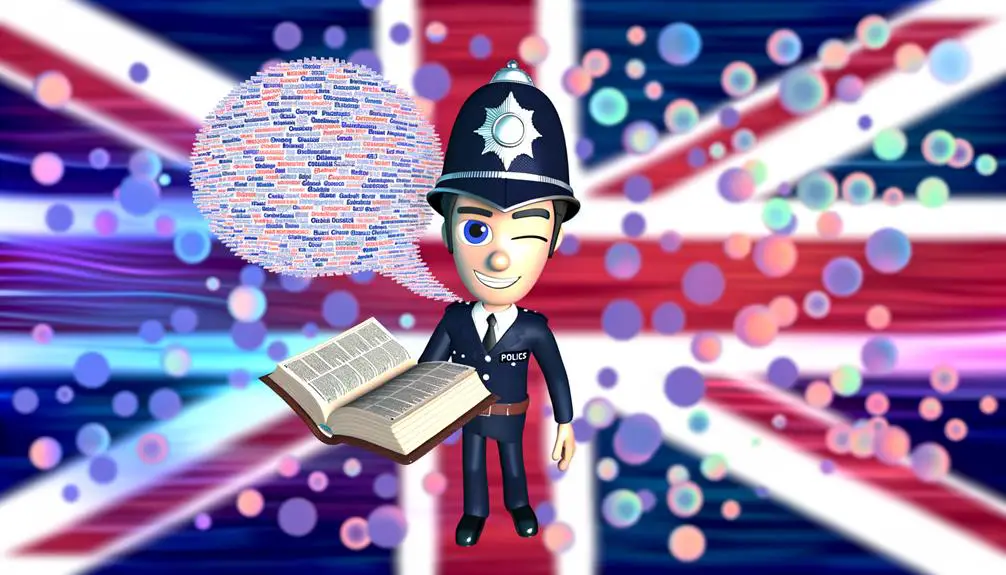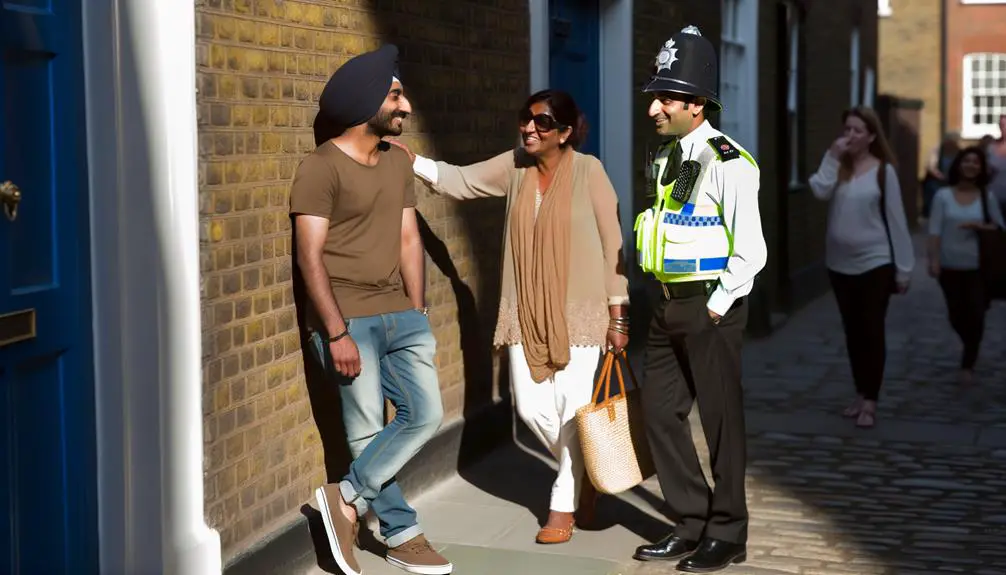In British slang, 'cop off' refers to engaging in a romantic or sexual encounter, typically in a casual or unplanned manner. It's derived from the verb 'to cop,' meaning to catch or grab, pointing to the spontaneity of these interactions. This term's playful evolution mirrors shifts in social attitudes towards dating and the influence of media and popular culture. As it varies regionally across the UK, mastering its nuances can enhance your social interactions, reducing ambiguity. Awareness of its contexts and potential essential is crucial. Grasping its full breadth opens a window into the dynamic nature of slang and social communication.
Key Takeaways
- 'Cop off' in British slang refers to engaging in romantic or sexual encounters.
- It often implies casual or unexpected romantic connections.
- The term has evolved from older slang meaning to catch or grab.
- Usage varies across the UK, reflecting regional dialects and cultural nuances.
- Media and popular culture have popularized and influenced the understanding of 'cop off'.
Origins of "Cop Off"
The term 'cop off' has woven its way into British vernacular, originating from the colloquial verb 'to cop,' which means to catch or grab, consequently evolving to signify a successful romantic or sexual encounter. This phrase etymology is a reflection of the fluid nature of language, especially within the domains of slang where expressions are often born from the depths of social interactions and cultural shifts. Understanding its linguistic roots offers an insightful glance into how casual language mirrors societal attitudes towards relationships and intimacy.
Delving deeper, 'to cop' itself traces back to older slang, with connections to the act of seizing or taking—actions that, metaphorically speaking, are involved in the process of initiating a romantic liaison. This transformation in meaning underscores the playful and often euphemistic tendencies in the evolution of slang terms. It's a linguistic journey from the literal act of grabbing to the metaphorical achievement of winning someone's affection.
As you explore the origins of 'cop off,' you're not just uncovering a simple phrase's backstory but dissecting a piece of cultural history. This exploration highlights the adaptability of language and its role in reflecting changing societal norms and behaviors.
Common Usage Scenarios
As you explore the phrase 'cop off,' it's important to recognize its dual contexts within British slang. Initially, it often refers to romantic encounters, capturing moments of flirtation or kissing. Conversely, in policing contexts, it takes on a different shade, signifying the act of catching or apprehending, which showcases the term's versatility in language.
Romantic Encounters Explained
In exploring the term 'cop off,' you'll find it's commonly used to describe a scenario where two individuals engage in a romantic or sexual encounter, often unexpectedly or casually. This expression encapsulates a range of interactions, from a spontaneous kiss at a party to more intimate connections. Understanding the nuances of 'cop off' is important, especially when maneuvering the complex world of dating. Effective communication strategies are paramount. Articulating intentions and reading social cues can greatly influence the outcome of these encounters. Additionally, dating tips often emphasize the importance of authenticity and mutual respect, which aligns with the casual yet consensual ethos implied by 'cop off.' Mastery of such slang and its connotations can enhance social interactions, making them more rewarding and less ambiguous.
Slang in Policing Context
Delving into the domain of policing, you'll discover that slang plays a pivotal role in the everyday communication among officers, often reflecting their experiences and the realities of their work. This specialized language, or police jargon, isn't just a shorthand; it's a tool that encapsulates complex enforcement tactics and scenarios in quick, understandable phrases. This jargon aids in vital decision-making and action, pivotal in high-stakes situations. For instance, terms like 'nick' for arrest or 'doing a runner' for someone fleeing, are not just colloquialisms but are steeped in the practicalities of law enforcement. They serve as a bridge between the procedural aspects of policing and the dynamic, often unpredictable nature of fieldwork, ensuring officers can communicate effectively and efficiently.
Variations Across the UK

Exploring the UK, you'll find that the meaning of 'cop off' can vary greatly from one region to another, reflecting local dialects and cultural nuances. The term, deeply embedded in British slang, takes on different shades of meaning depending on where you are. In the bustling cities of London and Manchester, 'cop off' might straightforwardly refer to a successful romantic or sexual encounter, a common understanding that ties back to broader urban dialects. However, venture into parts of Yorkshire or the Scottish Highlands, and the nuances shift, with local dialects and accent influence coloring the term's interpretation and usage.
Local dialects play a pivotal role in this variation. They act as linguistic markers, distinguishing communities through unique vocabularies and expressions. The accent influence is equally significant; it can alter the perception of the term, adding layers of meaning or altering its reception based on pronunciation subtleties. For instance, the intonation and emphases peculiar to the Scouse accent of Liverpool might imbue 'cop off' with a playful, less serious connotation than the more straightforward interpretation found in the South.
Understanding these regional variations requires not just a knowledge of British slang but an appreciation for the rich tapestry of local dialects and accents across the UK.
"Cop Off" in Media
As we've seen regional dialects shape the meaning of 'cop off,' it's equally important to examine its portrayal and influence within various media platforms. Media portrayal of 'cop off' greatly impacts its perception and understanding, especially among audiences unfamiliar with British slang. Films, TV shows, and music from the UK often incorporate this phrase, bringing a slice of British culture to global audiences. Through these mediums, 'cop off' is usually depicted in scenes depicting flirtation or the beginning of a romantic encounter, providing context that aids in comprehension.
Celebrity influence further amplifies the reach and acceptance of the term. When public figures use 'cop off' in interviews, social media, or in their artistic work, they endorse its usage and subtly educate their global audience about its meaning. This casual endorsement not only legitimizes the phrase but also embeds it more deeply into popular culture. Consequently, 'cop off' transcends its regional origins, becoming a recognized part of English vernacular worldwide, thanks to its media representation and celebrity endorsement. This phenomenon showcases the powerful role media and celebrities play in the evolution and globalization of slang.
Similar Phrases Worldwide

Across the globe, you'll find that many cultures have their own versions of 'cop off,' phrases that encapsulate the nuances of flirtation and romantic pursuit with equal vivacity. These expressions, rich in cultural context, provide a fascinating dive into the linguistic tapestry that binds human connections worldwide. They reflect not just the act of romantic engagement but the social fabric from which they emerge. Herein lies an opportunity to explore the linguistic tapestry that binds human connections worldwide.
- *France*: 'Draguer' – Directly translating to 'to dredge,' this term conveys the effort of trying to attract someone romantically.
- *Spain*: 'Ligar' – Similar to 'cop off,' it means to hook up or successfully attract someone's interest.
- *Italy*: 'Rimorchiare' – This vividly implies towing someone in, akin to catching their romantic interest.
- *Brazil*: 'Paquerar' – A term that embodies the act of flirting or courting someone with the hope of starting a romantic relationship.
- *Japan*: 'Nanpa' – Often used to describe a straightforward approach by men towards women they are interested in, highlighting a direct method of romantic pursuit.
Social Contexts Explained
You'll find that 'cop off' has a rich tapestry of origin and evolution, revealing much about British social interactions over the years. In everyday conversations, it's used in a variety of settings, pointing to its adaptability and the common scenarios where it's apt. Additionally, its regional variations shed light on the nuanced ways different parts of the UK embrace and modify slang, making 'cop off' a fascinating study in linguistic geography.
Origin and Evolution
To grasp the beginnings and transformation of the phrase 'cop off,' it's crucial to delve into the social contexts that have impacted its usage over time. Etymology debates suggest a diverse array of language influence, shaping the term's current significance.
- Historical shifts in British slang and colloquialisms
- Influence from media and popular culture
- Changes in social attitudes towards dating and relationships
- Cross-pollination with slang from other English-speaking countries
- The role of youth culture in evolving language
Understanding these factors offers insight into how 'cop off' has shifted from its origins to its modern usage. Analyzing this metamorphosis reveals the dynamic nature of language, constantly influenced by societal changes and cultural interactions.
Common Usage Scenarios
Understanding the various scenarios where 'cop off' is commonly used sheds light on its nuanced implications in different social settings. When managing the complex world of British slang, particularly in the context of dating advice, knowing when and how to use 'cop off' can be vital. It's typically invoked in casual conversations among friends, often serving as a playful or cheeky way to inquire about someone's romantic conquests or intentions. For example, in a social gathering, using 'cop off' as a conversation starter can signify your interest in the gossip or personal stories being shared. It's a term that implies a temporary, sometimes spontaneous romantic encounter, without the expectation of a serious relationship. Understanding its use helps in decoding social cues and enhances your conversational agility in informal settings.
Regional Variations
While exploring how 'cop off' integrates into casual conversations reveals its role in social dynamics, it's also important to ponder how its interpretation and usage can vary greatly across different regions within the UK. The nuances in dialect influences and pronunciation differences underscore the rich tapestry of British linguistic diversity.
- Dialect Influences: Certain areas may imbue the phrase with unique connotations or alternative phrases.
- Pronunciation Differences: Variations in accent can affect how 'cop off' is heard and understood.
- Cultural Contexts: Social settings and regional cultures shape how the term is used.
- Age Groups: Different generations might interpret or use the phrase distinctly.
- Local Slang Integration: In some regions, 'cop off' merges with local slang, creating hybrid expressions.
Understanding these variations enriches your grasp of British slang and its social contexts.
Misinterpretations to Avoid
Traversing the nuanced terrain of British slang, it's essential you're aware that 'cop off' can easily be misconstrued by those unfamiliar with its colloquial connotations. Misinterpretation consequences can range from minor confusions to potentially embarrassing situations, especially in social settings. For instance, mistaking 'cop off' for a term related to law enforcement or theft could lead to awkward misunderstandings, given its actual reference to kissing or making out.
To navigate these linguistic pitfalls, several avoidance strategies are paramount. First, context is key. The setting in which 'cop off' is used often provides crucial clues to its intended meaning. Paying attention to the conversation's tone and the speaker's body language can also help decipher the phrase's application accurately. Additionally, when in doubt, don't hesitate to ask for clarification. Most Brits are more than willing to explain their local jargon to outsiders, thereby preventing potential faux pas.
Moreover, familiarizing yourself with the broader spectrum of British slang can enhance your understanding and application of 'cop off' in the correct context. This proactive approach not only mitigates misinterpretation consequences but enriches your conversational agility, making your interactions more engaging and authentic.
Evolution Over Time

As you explore the evolution of 'Cop off,' it's imperative to trace its origins to understand how its meanings have shifted over time. You'll find that regional variations play a significant role in these changes, reflecting the dynamic nature of British slang. This journey through its linguistic history will illuminate the ways in which language adapts to cultural and societal shifts.
Origins of "Cop Off"
To comprehend the evolution of 'cop off', it is essential to delve into its origins, which reveal a diverse range of linguistic changes within British slang. Delving into its phonetic origins and the linguistic controversies surrounding it, offers a fascinating glimpse into how words adapt and thrive within a living language.
- Phonetic Origins: Tracing back to how sounds shift over time.
- Linguistic Controversies: Debates over its appropriateness and evolution.
- Social Influence: The role of societal changes in its usage.
- Regional Variations: How it differs across the UK.
- Media Impact: The role of television and film in popularizing the phrase.
This exploration into 'cop off' not only enriches your understanding of British slang but also highlights the fluid nature of language itself.
Changing Meanings
Building on our exploration of 'cop off,' it's important to examine how its meaning has evolved over time, reflecting broader linguistic shifts. This evolution is deeply rooted in language evolution and societal influences, illustrating the dynamic nature of slang. Initially, 'cop off' might have had a singular, straightforward meaning, but as societal norms and interactions expanded, so did the interpretations and contexts of this phrase. The change isn't just about the words themselves but how they're used within the fabric of society. As cultural dynamics shift, so do the connotations and frequencies of slang usage. This transformation is a reflection of the adaptability of language, highlighting how expressions morph in response to changing societal landscapes, encapsulating the fluidity of communication and cultural identity.
Regional Variations
The phrase 'cop off' exhibits fascinating regional variations, reflecting the diverse linguistic landscapes across the UK. These dialectical differences and pronunciation variations highlight the rich tapestry of British English. Here's what you might find intriguing:
- In Northern England, the term can carry a stronger connotation of success in romantic endeavors.
- Scottish dialects often imbue the phrase with a playful, yet slightly cheeky tone.
- In Wales, pronunciation variations might confuse outsiders, as the accent adds a unique twist.
- Londoners might use the term more casually, reflecting the city's diverse linguistic influences.
- In the Midlands, the term may be less about romance and more about 'getting away with something'.
Each region adds its own flavor, making 'cop off' a linguistic journey through the UK.
Linguistic Analysis

Analyzing the phrase 'cop off,' it's evident that its usage and meaning within British slang offer insight into social and cultural nuances. You'll find that regional influences and the phenomenon of semantic shift play pivotal roles in shaping the phrase's connotations and applications. This linguistic evolution reflects the dynamic nature of language, adapting to changes in societal attitudes and interpersonal interactions.
| Aspect | Description | Impact on 'Cop off' |
|---|---|---|
| Regional Influence | Geographical linguistic variations inform usage. | Diversifies interpretation |
| Semantic Shift | Changes in meaning over time due to cultural shifts. | Alters connotation |
| Social Attitudes | Reflects changing views on relationships and socializing. | Broadens usage |
| Interpersonal Interactions | Usage indicates type of social or romantic engagement. | Specifies context |
| Language Evolution | Ongoing changes in language reflect and influence society. | Ensures phrase remains relevant |
This table offers a structured visualization of the factors influencing 'cop off,' guiding you through the analytical process. It's clear that the phrase is more than a simple slang term; it's a linguistic marker of social dynamics, evolving through regional influences and semantic shifts to reflect the contemporary ethos. Understanding these linguistic nuances enriches your grasp of not just the phrase but also the living tapestry of British slang and its cultural underpinnings.
Cultural Significance
Delving into its cultural importance, you'll find that 'cop off' encapsulates the evolving dynamics of British social and romantic interactions. This phrase not only highlights the casual nature of some relationships but also sheds light on the broader shifts in communication and courtship within the UK. Its use is a demonstration of the flexibility of language, evolving with societal norms and values.
To further hook you into the essence of 'cop off', consider these points:
- It reflects the informal approach to dating and relationships, common in British culture.
- The term acts as a linguistic bridge, connecting generations through shared understanding, albeit with nuances.
- It presents linguistic barriers for non-natives, underlining the challenges of global perceptions of British slang.
- 'Cop off' contributes to the rich tapestry of British slang, showcasing the creativity and adaptability of the English language.
- The phrase's usage in media and conversations influences and mirrors the changing attitudes towards romance and social engagements.
Understanding 'cop off' offers a window into not just the language but the cultural heartbeat of Britain, maneuvering through linguistic barriers to paint a vivid picture of global perceptions and the ever-changing landscape of human connections.







